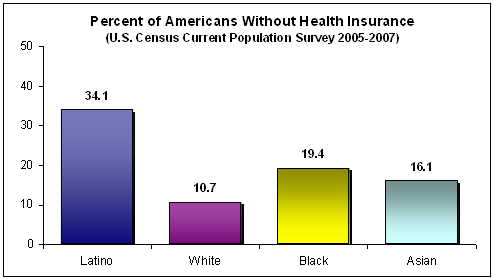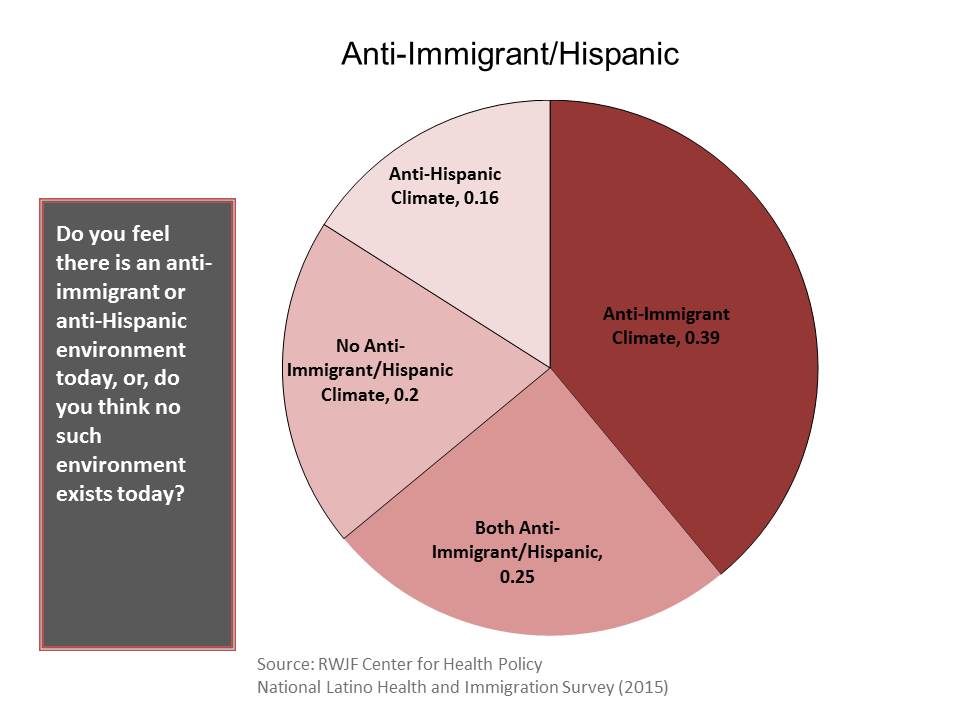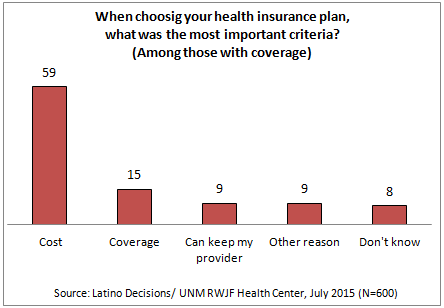In recent years, health care costs in the United States have been rapidly increasing. According to the OECD in 2007 total health spending accounted for 16% of the GDP in the United States, by far the highest share of any OECD country. Furthermore, since 1999 the average premium for family medical coverage has increased by 119% (The Henry J. Kaiser Family Foundation/Health Research/Educational Trust 2008). With rising costs combined with the economic downturn, many families are having to cut back on necessities such as food and electricity in order to afford health care and insurance (National Coalition on Health care 2009). While it is clear that we know that rising health care costs are affecting the general U.S. population we know very little about how the rising costs of medical care are affecting the Latino community or if high medical costs are influencing Latino public opinion toward health care reform policy. The Latino community is critical to examine in the context of rising medical costs because they are one of the most at risk U.S. populations in terms of health care and access. Latinos have the highest levels of uninsured rates, and the lowest percentage of people with employer coverage health insurance when compared to White Non-Hispanics, African-Americans, Asian/Pacific Islanders, American Indian/Alaska Native, and multi-racial persons (James, Thomas, Lillie-Blanton, and Garfield 2007). The number of Latinos who lack health insurance has steadily risen from 32.6% in 1999 to 34.1% in 2006 (Denavas-Walt, Proctor, and Smith 2008).
Since Latinos are a vulnerable population in terms of health care and access, I will first briefly discuss how high medical costs are impacting this community and also how these costs might be influencing their public opinion regarding health care reform.
First, a Latino Decisions/RWJF-UNM Center Poll from May of 2009 found that both insured and uninsured Latinos are facing financial and health care hardships due to high medical costs. For example, 28% of insured Latinos and 45% of uninsured Latinos experienced difficulty paying other bills due to high medical bills. Furthermore, 17% of insured Latinos and 50% of uninsured Latinos skipped a recommended medical test or treatment due to high medical costs. While it is clear that uninsured Latinos are clearly impacted greatly by high medical costs, insured Latinos are not completely protected from increasing medical costs. Thus, it is clear that high medical costs are affecting the Latino community; but do these costs influence Latino public opinion regarding health care reform policy?
A new Latino Decisions/RWJF-UNM Center/impreMedia survey in November finds that Latinos overwhelmingly support health care reform policy; 61% of Latinos support an expansion of coverage even if it means increasing taxes. However, why do Latinos favor health care reform? Table 1 below shows that the three main reasons Latinos favor health care reform are: too many uninsured, costs are out of control, and the need to make health care more affordable. Thus, 45% of Latinos feel that we need to reform health care due to costs and affordability issues (see table 1). Clearly costs and affordability issues are affecting Latino public opinion in favor of health care reform policy.
Table 1: What Is the Main Reason You Favor Health Care Reform?
| Latino Decisions Poll (11/09) | |
| Selected Responses | (% Yes) |
| People Need Health Insurance/Too Many Uninsured | 30% |
| Costs Are Out of Control | 23% |
| Need to Make Health Care More Affordable | 22% |
Table 2 shows that there is little difference among insured and uninsured Latinos in their reasons for favoring health care reform; 19% of uninsured Latinos and 23% of insured Latinos favor health care reform in order to make it more affordable, while 25% of uninsured Latinos and 24% of insured Latinos favor health care reform due to costs being out of control. Thus, even among insured Latinos costs and affordability are main reasons behind their public support of health care reform.
Table 2. What is the main reason you favor health care?
Among uninsured and insured Latinos
| Latino Decisions Poll (11/09) | No Insurance | Have Insurance |
| Too many uninsured | 28% | 30% |
| System is broken | 9% | 14% |
| Need to make health care more affordable | 19% | 23% |
| Costs are out of control | 25% | 24% |
| Respondent or family member lacks coverage | 11% | 2% |
| Don’t trust insurance companies | 8% | 7% |
Table 3 below shows that for U.S. born Latinos, affordability is more important in their support of health care reform policy, while high costs are more important for foreign born Latinos in their support of health care reform policy. Overall, it is critical to note that not only are Latinos clearly affected by high medical costs, but also a significant portion of Latinos support health care reform policy due to costs and affordability issues associated with medical care. Clearly, uninsured Latinos are a more vulnerable population, but costs and affordability of health care also are top concerns of insured Latinos as well. While expanding coverage to the uninsured is a top priority of Latinos this analysis shows that costs and affordability are top concerns influencing Latino public opinion in favor of health care reform as well. As President Obama and Congress move toward expanding coverage, they should be aware that costs and affordability are major concerns of the Latino community and that providing greater access to coverage does not prevent vulnerable populations such as Latinos from facing tremendous economic hardships when they require medical care.
Table 3. What is the main reason you favor health care?
| Latino Decisions Poll (11/09) | Foreign Born | U.S. Born |
| Too many uninsured | 32% | 27% |
| System is broken | 10% | 16% |
| Need to make health care more affordable | 18% | 26% |
| Costs are out of control | 27% | 22% |
| Respondent or family member lacks coverage | 3% | 4% |
| Don’t trust insurance companies | 9% | 5% |
Jillian A. Medeiros, Ph.D.
Robert Wood Johnson Post-Doctoral Fellow
Assistant Professor
Department of Political Science
University of New Mexico



